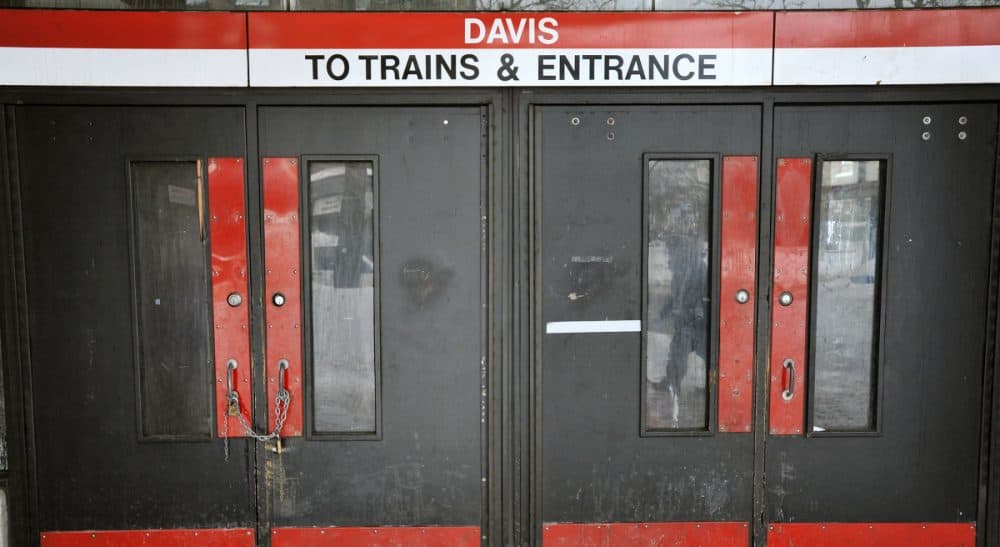Advertisement
To Reform The MBTA, Change Is Good, But Revenue Is Better

Wednesday, Gov. Charlie Baker's special panel on the MBTA released "Back on Track: An Action Plan to Transform the MBTA." Our state's public transportation system sorely needs substantive reforms and governance changes. The state must also invest in the MBTA for the sake of our economy.
We now know what happens when the MBTA is unable to carry the almost 1.3 million riders who use and rely on the system every day: The employees who power the Massachusetts economy cannot get to their jobs. These jobs provide income and discretionary spending power, which puts money in the pockets of our businesses, retailers and restaurants, which, in turn, generate sales and meals taxes. These jobs also deliver income taxes into the Treasury, and, combined, this revenue helps fund services to taxpayers across the commonwealth. What's more, the lack of transit service increased congestion and travel time as people who needed to get to work got off trains and into their cars. All of this imposed significant costs on our economy. This test verified vividly that the MBTA is a cornerstone of our economy.
We now know what happens when the MBTA is unable to carry the almost 1.3 million riders who use and rely on the system every day.
The MBTA’s assessment area comprises 175 communities and almost 4.7 million people — that's nearly 70 percent of the Massachusetts population. Roughly half the trips into Boston are made on transit. If people are forced out of transit, we cannot count on the highway system to accommodate additional vehicle trips; the capacity is simply not there.
Transportation access is among the top five criteria used by CEOs when deciding where to locate businesses. If employees can’t get to their jobs, and if companies have limited access to goods and services, businesses begin to think twice about setting up shop in Massachusetts.
The relationship is clear: A failing T means a failing economy.
Fortunately, the Massachusetts economy is doing very well. Companies are growing, the workforce is increasing, and people want to live near public transit. The Metropolitan Area Planning Council projects that there will be 75,000 new residential units and commercial space and 130,000 new jobs located near MBTA transit and commuter stations by 2035. The South Boston Waterfront could see 17 million square feet of new development, 9,200 new residents and 22,900 new jobs by 2035.
Northeastern University’s 2012 report, Hub and Spoke, projects that the MBTA could see an additional 367,000 daily riders in just six years.
We need to ask ourselves: Should the capacity of our transit system stagnate or increase to accommodate forecast growth? When the economic implications of a stalled transit system are considered, it’s no choice at all. Therefore, we need solutions to address the daunting $6.7 billion state of good repair gap the MBTA faces while also making strategic investments to grow the capacity of the MBTA.
Governor Baker and the Legislature need to come together and act to reignite the MBTA as the engine of our economy. Here are some solutions they could consider:
On reforms, progress has been made at the MBTA. For example, employees can no longer retire after just 25 years, and employees now receive health insurance through the Group Insurance Commission. But more can be done to make the employee benefits at the MBTA more cost effective. The MBTA also needs to reexamine things like the arbitration process, procurement procedures, and how it purchases energy to reduce excessive financial burdens on the agency. To help put the agency on better financial footing, the commonwealth could also assume at least a portion of its massive debt burden.
Advertisement
Governor Baker and the Legislature need to come together and act to reignite the MBTA as the engine of our economy.
We will not be able to tackle this crisis through reforms and efficiencies alone. The need for new revenue to support the MBTA and our entire transportation system is inevitable, and there are several options to consider. One is to increase the gas tax to make up for the fact that it does not rise with inflation. Last year’s repeal of the gas tax’s inflation adjustment leaves a $1 billion hole in transportation funding that must be filled. We can also place a sales tax on gasoline and dedicate a portion of that to the MBTA, or examine exemptions to the motor vehicle sales tax. Massachusetts could join other states that are piloting the use of vehicle miles traveled to measure a fee on cars. And, we could begin the process of tolling more roads and highways and developing new approaches, like tiered tolling for express lanes.
Reform is an ongoing process, and ensuring efficient use of taxpayer dollars is essential. But significant new investment is what is needed for us to seize our full economic potential with a stronger MBTA.
